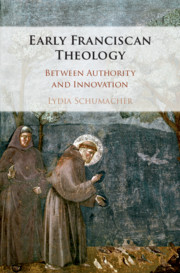Book contents
- Early Franciscan Theology
- Early Franciscan Theology
- Copyright page
- Dedication
- Contents
- Acknowledgements
- Abbreviations
- Chapter 1 Early Franciscan Theology: An Introduction
- Chapter 2 The Franciscan Context
- Chapter 3 The Philosophical Context
- Chapter 4 Theological Vision
- Chapter 5 Theistic Proof
- Chapter 6 The Divine Nature
- Chapter 7 The Trinity: Context
- Chapter 8 The Trinity: Doctrine
- Chapter 9 Christology
- Chapter 10 Incarnation
- Chapter 11 Moral Theology
- Chapter 12 Conclusion: The Promise of Early Franciscan Theology
- Bibliography
- Index
Chapter 7 - The Trinity: Context
Published online by Cambridge University Press: 14 June 2019
- Early Franciscan Theology
- Early Franciscan Theology
- Copyright page
- Dedication
- Contents
- Acknowledgements
- Abbreviations
- Chapter 1 Early Franciscan Theology: An Introduction
- Chapter 2 The Franciscan Context
- Chapter 3 The Philosophical Context
- Chapter 4 Theological Vision
- Chapter 5 Theistic Proof
- Chapter 6 The Divine Nature
- Chapter 7 The Trinity: Context
- Chapter 8 The Trinity: Doctrine
- Chapter 9 Christology
- Chapter 10 Incarnation
- Chapter 11 Moral Theology
- Chapter 12 Conclusion: The Promise of Early Franciscan Theology
- Bibliography
- Index
Summary
In his magisterial history of Trinitarian doctrine, Théodore de Régnon defended the then novel thesis that the late Middle Ages witnessed the branching off of a new tradition of Trinitarian theological thinking from the previously relatively continuous tradition of Western Trinitarianism founded by Augustine.1 From this time forward, he contends, there were two main traditions of Western Trinitarian thought, including the original tradition of Augustine, which was carried forward by the likes of Anselm, Peter Lombard, and Aquinas, who expressed it in its mature form, and the new tradition, initially formulated by Richard of St Victor and later developed more fully by the Franciscans, who adhere to it to this day.2 Although some of De Régnon’s other theses have since come into question – most notably, his tendency to insist on the incommensurability of the Greek and Latin patristic Trinitarian traditions – his suggestions regarding the medieval development of the doctrine of the Trinity in the West have withstood the tests of time and further research.
- Type
- Chapter
- Information
- Early Franciscan TheologyBetween Authority and Innovation, pp. 143 - 162Publisher: Cambridge University PressPrint publication year: 2019



